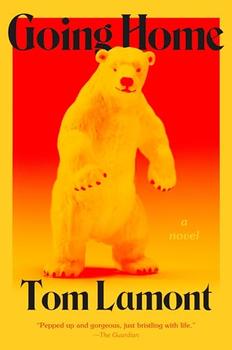Summary | Excerpt | Reading Guide | Reviews | Beyond the Book | Readalikes | Genres & Themes | Author Bio

“Hello, Miss James. Good trip down?”
“Yes, thanks.” She looked him straight back in the eyes, daring him to ask her anything more.
He nodded and pointed her toward the bus’s open door. Iris pulled herself up the three short stairs and into the bus. There was a foreign couple, a couple of stray women sitting alone, and an assortment of men clustered around Flores’s seat at the front of the bus. Iris nodded and made her way toward the back, past a young woman with her head in a thick book, the curve of her neck laid bare as her hair swept forward. She did not look up, and she didn’t stir as Iris passed her by to find a seat three rows back.
Iris reached into her skirt pocket for her cigarettes, shook out a Lucky, and considered the head and shoulders of the little child- woman reading in front of her. A runaway, thought the postmaster, though she was quite well dressed in a sensible blue suit, her brown hair cut short and feathering along the straight edge of her collar. In any case, she was the sort who needed tending, the small- breasted women who tip their faces up to men, smiling delightedly as babies. At last the little creature turned slightly, as if to meet Iris’s gaze, aware of her attention, and gave a noncommittal smile— a mechanical response like a hand put out to ward off the sun. Iris nodded, companionably, exhaling smoke. It’s all right—she addressed the woman’s back, now turned away again— I won’t bite. The bus bounced a little as Mr. Flores climbed up behind the wheel and swung himself into his seat, and the engine roared to life, shaking the floor under Iris’s feet.
Vronsky was making love to Anna.
Emma read the sentence again, distracted by the pillar of a woman behind her. Did Tolstoy really mean making love? She couldn’t think so. Having sex? It would be so bald written on the page like that. Surely they can’t have been making love here and there like this in the nineteenth century. It must refer to something else, something more benign. She flushed, a little guiltily. Not that having sex wasn’t benign— of course it was, it led to babies, after all. Though the things that she and Will had begun to do in the dark had nothing whatsoever to do with babies. But Anna and Vronsky? They had been constrained, wasn’t that the idea? Perhaps it was the translation. She flipped to the cover of the book and read the name beneath Tolstoy’s— Constance Garnett. Emma thought she understood. Vronsky had whispered something loving to Anna, or soothed Anna lovingly, or something like that, and Miss Garnett had used other words instead, painting what ought to be a pink scene— scarlet. Probably a spinster; the pathetic type who reads passion into the twist of a shut umbrella. Like that woman in the back of the bus.
She pushed her bottom back a bit against the seat on the bus so that she sat up straighter, the doctor’s new wife in a very attractive travel suit with a matching scarf thrown around her shoulders. She stared out the window. Since she had said to Will Fitch two weeks ago— hurriedly, afraid to look up at him, Yes. Yes, I will. I do— something firm and satisfying and entirely new had entered into the frequent chaos of her mind. As though Edward R. Murrow’s voice, that brave, impassioned masculine voice, full of its own urgency and volume, had laid down the track upon which she now hummed. Clarity ran upon that track, and purpose.
Pamet. Then Dillworth. Finally Drake. Closing her eyes, Emma recited the names of the towns she knew only through Will’s letters, in which the geography of her new land was mapped by the various ailments of the people he treated. Heart disease. Bursitis. A pair of twins delivered in Drake, which was a miracle, wrote Will, given that the mother had neither the time nor the means to get off the Cape quick enough—
Excerpted from The Postmistress by Sarah Blake. Copyright © 2010 by Sarah Blake. Excerpted by permission of Amy Einhorn Books. All rights reserved. No part of this excerpt may be reproduced or reprinted without permission in writing from the publisher.



Going Home
by Tom Lamont
Going Home is a sparkling, funny, bighearted story of family and what happens when three men take charge of a toddler following an unexpected loss.

The Secret History of the Rape Kit
by Pagan Kennedy
The story of the woman who kicked off a feminist revolution in forensics, and then vanished into obscurity.
Your guide toexceptional books
BookBrowse seeks out and recommends the best in contemporary fiction and nonfiction—books that not only engage and entertain but also deepen our understanding of ourselves and the world around us.